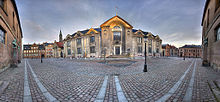
Back Universiteit van Kopenhagen Afrikaans Universität Kopenhagen ALS جامعة كوبنهاغن Arabic جامعة كوبينهاجين ARZ Universidá de Copenḥague AST Kopenhagen Universiteti Azerbaijani کوپنهاق بیلیمیوردو AZB Копенгаген университеты Bashkir Капенгагенскі ўніверсітэт Byelorussian Копенхагенски университет Bulgarian
Københavns Universitet | |
 | |
| Latin: Universitas Hafniensis | |
| Motto | Latin: Coelestem adspicit lucem |
|---|---|
Motto in English | It (the eagle) beholds the celestial light |
| Type | Public research university[1] |
| Established | 1 June 1479 |
Academic affiliation | IARU LERU EUA Europaeum Universities Denmark[2] |
| Budget | DKK 8.908 bn ($1.338 bn) (2018)[3] |
| Rector | Henrik C. Wegener[4] |
Academic staff | 5,286 (2019)[5] |
Administrative staff | 4,119 (2017)[5] |
| Students | 37,493 (2019)[6] |
| Undergraduates | 21,394 (2019)[6] |
| Postgraduates | 16,079 (2019)[6] |
| 3,106 (2016)[7] | |
| Location | , |
| Campus | Urban 94.2 ha (total) |
| Student newspaper | Uniavisen |
| Colors | Maroon and gray[8] |
| Website | www.ku.dk |
55°40′47″N 12°34′21″E / 55.67972°N 12.57250°E
The University of Copenhagen (Danish: Københavns Universitet, abbr. KU) is a public research university in Copenhagen, Denmark. Founded in 1479, the University of Copenhagen is the second-oldest university in Scandinavia after Uppsala University.
The University of Copenhagen consists of six different faculties, with teaching taking place in its four distinct campuses, all situated in Copenhagen.[9][10] The university operates 36 different departments and 122 separate research centres in Copenhagen, as well as a number of museums and botanical gardens in and outside the Danish capital.[11] The University of Copenhagen also owns and operates multiple research stations around Denmark, with two additional ones located in Greenland.[12][13] Additionally, The Faculty of Health and Medical Sciences and the public hospitals of the Capital and Zealand Region of Denmark constitute the conglomerate Copenhagen University Hospital.[14]
As of October 2022, 10 Nobel laureates[15] and 1 Turing Award laureate have been affiliated with the University of Copenhagen as students, alumni or faculty.[16] Alumni include one president of the United Nations General Assembly and at least 24 prime ministers of Denmark.
- ^ "About the universities". Ministry of Higher Education and Science. Archived from the original on 13 January 2020. Retrieved 13 January 2020.
- ^ "Universities Denmark". Universities Denmark. Archived from the original on 9 August 2018. Retrieved 26 July 2020.
- ^ "Økonomi". University of Copenhagen. 23 August 2016. Archived from the original on 20 April 2019. Retrieved 18 November 2019.
- ^ "Rector". University of Copenhagen. 28 February 2017. Archived from the original on 25 July 2020. Retrieved 25 July 2020.
- ^ a b "Employees". University of Copenhagen. 23 August 2016. Archived from the original on 15 August 2019. Retrieved 24 July 2020.
- ^ a b c "Students". University of Copenhagen. 23 August 2016. Archived from the original on 25 February 2019. Retrieved 25 July 2020.
- ^ "Forskning og formidling" [Research and circulation] (in Danish). University of Copenhagen. Archived from the original on 26 July 2017. Retrieved 16 January 2015.
- ^ "University of Copenhagen Design Guide". University of Copenhagen. 4 December 2008. Archived from the original on 6 August 2020. Retrieved 24 August 2020.
- ^ "Faculties of the University of Copenhagen". University of Copenhagen. 16 September 2008. Archived from the original on 3 August 2020. Retrieved 25 July 2020.
- ^ "Departments at the University of Copenhagen". University of Copenhagen. 16 September 2008. Archived from the original on 3 August 2020. Retrieved 25 July 2020.
- ^ "Museums". about.ku.dk. 16 September 2008. Archived from the original on 3 August 2020. Retrieved 24 July 2020.
- ^ "Areas of research". research.ku.dk. 28 May 2019. Archived from the original on 12 August 2020. Retrieved 24 July 2020.
- ^ https://www.science.ku.dk/fakultetet/organisation/feltstationer/ Archived 12 August 2020 at the Wayback Machine (in Danish). Retrieved 24 July 2020.
- ^ Larsen, Jørgen Falck; Engelbrecht, Nils: Københavns Universitetshospital in 'Den Store Danske' at https://denstoredanske.lex.dk/K%C3%B8benhavns_Universitetshospital Archived 24 July 2020 at the Wayback Machine (in Danish). Retrieved 25 July 2020.
- ^ Kommunikation (5 October 2022). "Nobelpristagere". universitetshistorie.ku.dk (in Danish). Archived from the original on 16 October 2022. Retrieved 6 October 2022.
- ^ "Peter Naur - A.M. Turing Award Winner". Archived from the original on 3 July 2017. Retrieved 27 October 2016.

